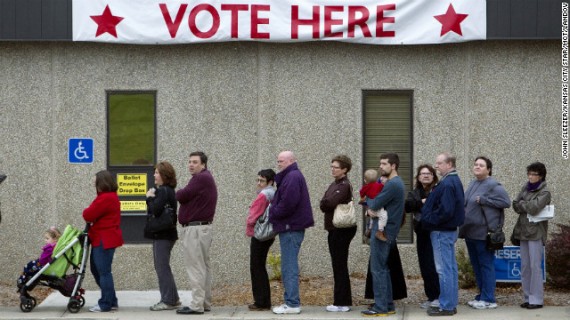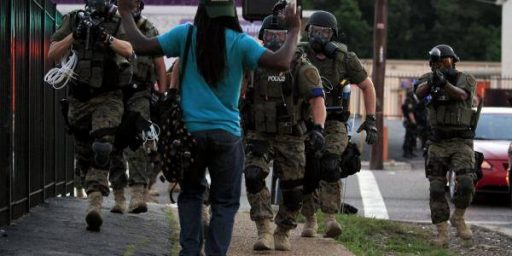America’s Dysfunctional Election System
Fareed Zakaria declares "America's election process an international embarrassment." He's right.
Fareed Zakaria declares “America’s election process an international embarrassment.”
Imagine a country on election day where you know the results the instant the polls close. The votes are counted electronically, every district and state has the same rules and the same organized voting procedure. It is managed by a non-partisan independent body. Sounds like the greatest democracy in the world, right? Try Mexico. Or France, Germany, Brazil. Certainly not the United States of America.
America has one of the world’s most antique, politicized and dysfunctional procedures for its elections. A crazy quilt patchwork of state and local laws with partisan officials making key decisions and ancient technology that often breaks down. There are no national standards. American voters in more than a dozen states, for example, don’t need ID. But even India, with a GDP just 12 percent that of ours, is implementing a national biometric database for 1.2 billion voters. The nascent democracy in Iraq famously dipped voters’ fingers in purple to ensure they didn’t vote again. Why are we so behind the curve?
The conservative columnist David Frum recently wrote an excellent article for CNN.com and he tells a story about the 2000 presidential election. The city of St. Louis, Missouri had outdated voting equipment. So there were long delays in voting. But St. Louis was heavily democratic, so Al Gore’s campaign asked a judge to extend voting by three hours.
The judge agreed. But then George W. Bush’s campaign protested, and the judge was overruled. Meanwhile voting had already continued 45 minutes past the legal time.
Is that how elections should work in the world’s greatest democracy? In most other democracies, an independent national body would make the big decisions. There would be non-partisan observers at the polls. And of course, there would be modern, functioning equipment. Even Venezuela, which had elections last month, had electronic voting booths with biometric technology across the country.
Aside from the strange obsession with verifying that people aren’t committing in-person election fraud of the sort there’s next to zero evidence happens in America, this is surely correct.
After the 2000 election debacle, we were supposed to standardize voting processes across the country. We didn’t. Indeed, about the only thing we accomplished was doing away with punch-card ballots with hanging chads.
The use of partisan election officials at the state and local levels is especially bizarre. I’d say that it’s the sort of thing a banana republic would do, except for the fact that the banana republics have stopped the practice. Even if they make their rulings honestly and honorably—and I’m sure that most of them do—the public will naturally be skeptical when rulings go against their preferred candidate or party.







@James Joyner
Frum makes another important point in the article you link:
This is the cognitive dissonance that emerges in discussions of vote fraud in the U.S. Many who want security against potential mischief oppose the only reforms that can deliver real security. Instead, they argue we must double-down on the patchwork of local laws and regulation which are the very source of instability.
And yet, this is the rationale given for Voter ID laws…
State’s Rights!1!1!!!!!!
There are so many layers of irony in that cited article and in the main blog post you’d actually need a flow chart to keep track of them all.
Suffice it to say that cocoons are not merely for caterpillars and that a liberal Democrat like Zakaria bemoaning how elections are conducted in this country is akin to William Jefferson and Alcee Hastings complaining about how Jon Corzine conducted his business or even more aptly it’s tantamount to a drug pusher complaining about crime, poverty and blight in the same inner city neighborhood in which he deals smack.
Although we had issues with voter ID legislation and other partisan shenanigans, the actual voting process here in Texas (San Antonio) is quite good. Two full weeks of early voting with ability to vote anywhere in the county (the electronic voting machines will pull up the ballot specific to your precinct) and generous hours of operation followed by election day voting with ample voting machines that seem to have a minimum of breakdowns. Even though the election official is an elected position, the emphasis is on smooth administration.
When I hear what goes on in the rest of the country, I just shake my head. But unless there is a lot of noise made by the populace, the temptation to play games by the politicians will go on.
Government of the people, by the people, for the people. That includes the crazies and the neglectful.
I have to present an ID Card and a special Voter ID to vote, sign a list, there are a half-dozen of non-partisan observers in the voting room, I even can get a receipt proving that I vote. Even so I see people complaining about fraud.
@Scott: Same in Austin. And some counties (10, so far) allow you to vote anywhere in the county on Election Day, not just your assigned precinct. It is a fairly new state law (2009 session, I think), so it is taking a while for counties to warm up to it. Travis is the largest and urban county to implement it at this point.
I’ve voted in MA, CT, and TX (Bexar and Travis counties), and Texas’s voting processes have been the most user friendly by far.
The problem is federalism. Since each state controls its own elections, and those elections in turn determine who controls the federal government, we’re pretty much stuck with this haphazard patchwork unless there’s a constitutional amendment.
And, electronic voting will never be a viable option nationwide due to security concerns–hackers around the planet would line up for a change to mess it up. That, and of course the conspiracy theorists on both sides would have a fit.
Any intelligent person could sit down and create an optimal election system for the USA in half an hour.
The problem is that the Republican Party has an interest in suppressing voter turnout, particularly young and minority voters. So they try to design the election process to do exactly that.
For example in Florida they restrict early voting, even though that has zilch to do with stopping in person voter fraud. On the other hand, they make it easy to do mail in absentee voting, which is a lot easier to make fraudulent. Why is that? Because mail in absentee ballot voting is popular among seniors-who tend to vote Republican.
The good thing about this is that all of these voter suppression shenanigans are undergoing scrutiny from the courts and media, and most of these have been struck down by the courts. Its up to the Democrats now to press their advantage and work towards a system more like Zakaria suggests.
After that, they can look into non-partisan redistricting. Gerrymandering after 2010 has made it near impossible for the Democrats to regain a majority in the House, even if the election procedures were miraculously made perfect.